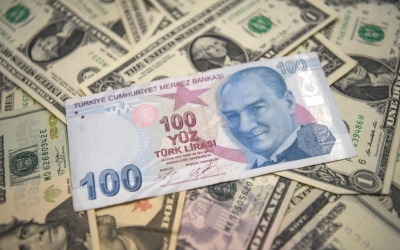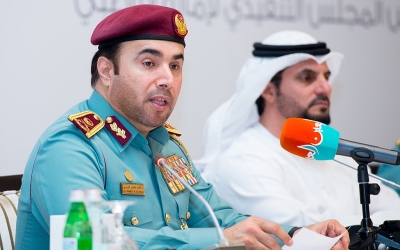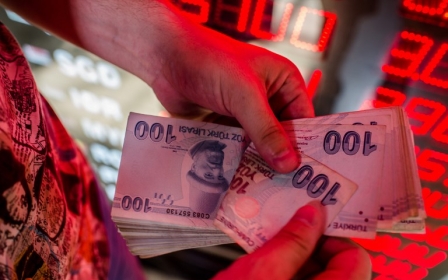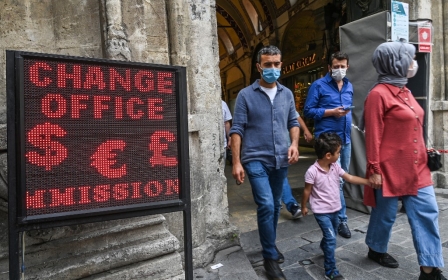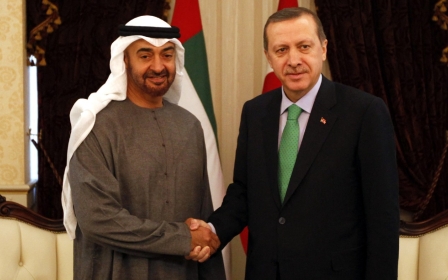MBZ in Turkey: Will Emirati investments be a lifeline for Erdogan?
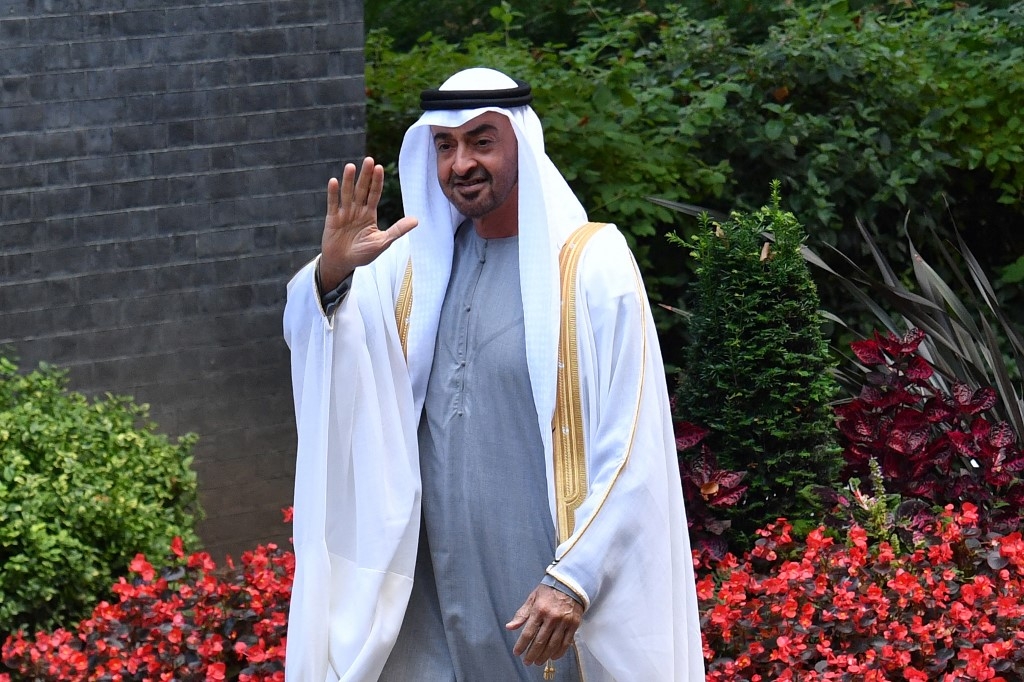
After 10 years of regional competition and accusations of plotting to take down the Turkish government, Abu Dhabi's Crown Prince Mohammed bin Zayed al Nahyan will visit Ankara on Wednesday.
Turkey and the United Arab Emirates have began to rejuvenate relations over the past year with sudden speed, following a string of political and proxy conflicts in places such as Libya, Egypt and the Horn of Africa. That's led many questioning what each side are getting out of the detente.
Turkish officials, speaking anonymously due to government protocol, told Middle East Eye that the UAE’s declaration of willingness for a rapprochement behind closed doors earlier this year started the process.
“There is no space for emotions in the foreign policy,” one Turkish official said. “Everyone is aware that a foreign policy based on conflicts doesn't serve any benefits to anyone.”
Turkish officials are keen on repeating the line that Turkey has not moved from any of its positions in order to better relations with Mohammed bin Zayed, the United Arab Emirates' most powerful figure also known as MBZ.
“We are still in Libya, still in the Horn of Africa,” the second official said. “We still do what we do.”
The officials believe some Emirati moves that brought the UAE into conflict with Turkey, such as in Libya where they allegedly funded Wagner Russian mercenaries in an attempt to topple the Tripoli government, have backfired and angered the United States.
“Their previous strategy was much more costly,” the second official said. “Now with the Joe Biden administration in the US, they need allies to balance Iran.”
Sense of opportunity
Cinzia Bianco, a Gulf expert at the European Council on Foreign Relations (ECFR) think tank, agrees that the UAE has had to make policy changes due to the clear inputs from the Biden administration and internal factors, such as the need to cut back on costly and ineffective aggressive foreign policy to focus on post-Covid recovery.
“However, there is also a clear sense of opportunity vis-a-vis Turkey,” Bianco told MEE. “While Ankara might not have changed its regional policies, the perception is that the Turkish government is now much more open to compromises.”
'While Ankara might not have changed its regional policies, the perception is that the Turkish government is now much more open to compromises'
- Cinzia Bianco, analyst
One example of this is Turkey's new approach to Egyptian opposition TV channels based in Istanbul.
Earlier this year, Turkish officials asked some channels, including ones belonging to the UAE's enemy the Muslim Brotherhood, to end some of their political programming. Though they weren't ejected from the country, the move was an open declaration that Ankara was distancing itself from the Brotherhood and open to warming ties with counties such as the UAE and Egypt.
One lingering issue is that the Turkish government has quite openly accused Abu Dhabi of financially aiding the coup plot in 2016, chiefly blaming Palestinian operator Mohammed Dahlan of being the go-between. Dahlan denies the accusation.
Ankara appears to have lost interest in this issue. Yet Turkish officials note that Dahlan isn't as visible as he used to be. Some refer to the unproven allegations that Dahlan was placed under house arrest, yet he still tweets through his official Twitter account on Palestinian issues.
A separate source, who is familiar with the UAE-Turkish contacts, said both sides were now exchanging views on the regional issues and have agreed to disagree on some areas. For example, the source said, Turkey conveyed its opposition to the UAE's steps this month towards normalising relations with the Syrian government.
Emirati investment
One incentive reportedly used by Mohammed bin Zayed to soften Turkish President Recep Tayyip Erdogan's stance has been the promise of large investments in Turkey.
A well-placed source told MEE that the crown prince told Erdogan in a phone call earlier this year that he was ready to invest as much as $100bn. Others said the number was at least $10bn. Both hefty numbers that would boost Turkey's flagging economy.
The Abu Dhabi Investment Authority and companies close to the Abu Dhabi royal family have already publicly expressed interest in healthcare, financial technology targets and other industries, eyeing $3bn-4bn in investments.
A senior Ankara delegation led by trade and economy ministers, accompanied by Turkish businessmen, is also in Abu Dhabi today to discuss investment opportunities.
The Emirati offers come as Turkey suffers a spiralling currency crisis, undermining the government ahead of the 2023 presidential elections. Erdogan’s popularity has plummeted to 38 percent according to a poll conducted in October.
Believed to be mainly driven by Erdogan’s anti-interest rate views, the US dollar has appreciated against the Turkish lira by nearly 55 percent since the beginning of January. Inflation is also well above the official 20 percent.
In a private meeting earlier this month with a Turkish politician, Erdogan reportedly cited the possible large Emirati investments as something that would help him stabilise the economy.
Turkish officials say the investment would be a win-win for both sides, as the UAE is looking for new countries to invest in and Turkey is a lucrative market.
“There would be some gradual Emirati steps for de-escalation in the region,” the second Turkish official said. “And looking to the horizon, these large investments will not arrive in a year but within several years, which would strengthen bilateral relations."
'Everyone is aware that a foreign policy based on conflicts doesn't serve any benefits to anyone'
- Turkish official
Bianco, the Gulf expert, says Abu Dhabi believes that the regional alignment against Turkey in the eastern Mediterranean, together with the economic and financial hardships and Erdogan’s disappointing performance in opinion polls, have made the Ankara government way more open to tweaking regional policies in exchange for Emirati support.
“Especially investments but also a reciprocal toning down of maximalist goals such as in Libya,” she said. “On top of that, their investments into Turkey also have an economic motivation - there are several real bargains to be made with the lira so devalued.”
However, the constant depreciation of the lira, which lost 20 percent of its value in November, also complicates potential Emirati investment.
An Abu Dhabi-based source said the fluctuations were making the Emirati investors uncomfortable because whatever they planned to purchase or invest in was constantly getting cheaper.
This article is available in French on Middle East Eye French edition.
Middle East Eye delivers independent and unrivalled coverage and analysis of the Middle East, North Africa and beyond. To learn more about republishing this content and the associated fees, please fill out this form. More about MEE can be found here.


